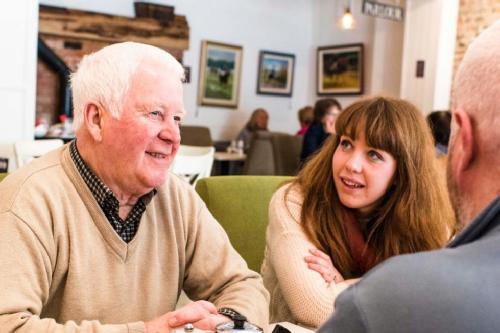
Communicating With A Loved One Who Has Dementia
It's indescribably painful to witness the deterioration of a loved one who suffers from Alzheimer's disease or another type of dementia. As the disease progresses, we see minor forgetfulness morph into severe impairment, eventually causing communication to become a problem. Knowing how to communicate and connect with our loved ones who suffer from forms of cognitive impairment is important as the disease progresses.
How to Communicate With Someone with Alzheimer's or Dementia
According to the Alzheimer's Association, one in 10 Americans have a family member with Alzheimer's, and one in three know someone with the disease. Since people are living longer, more and more Americans are suffering from memory disorders - which means every family is likely to be affected at some point.
Learning techniques about how to act and what to say to someone with Alzheimer's or dementia can help families emotionally connect with their loved ones. As with any brain disorder, there are special approaches involved with communication.
You can't be judgmental or critical to aging loved ones who suffer from memory impairment or dementia, and asking detailed questions is probably not the best idea. When all else fails, ask open-ended questions and keep the conversation going smoothly. Help your loved one feel comfortable as the human connection is the most powerful.
Listed below are some strategies to help you and your aging loved ones maintain a positive relationship, despite Alzheimer's or dementia.
Ways to Act Around Someone With Alzheimer's or Dementia
If you want to connect meaningfully with your loved one who suffers from memory impairment, you have to set the mood.
- Avoid distractions. Create a comfortable ambiance that doesn't have a lot of stimuli so that your loved one can focus all their mental energy on the conversation.
- Be a good listener. Not your head and interact with your loved one's conversation. If you don't understand something, politely ask open-ended questions.
- Don't criticize. Be compassionate and do not try to correct your loved one if they are inaccurate. Feel free to go along with their delusions and misstatements to see where the conversation takes you.
- Use a calm voice and warm tone. Don't be condescending, and don't use heightened emotion. Speak clearly using a calm manner.
- Use names. Avoid pronouns and refer to people by their names. Be sure to greet your loved one with their name.
- Use nonverbal cues. Keep eye contact and smile around your loved one. Maintaining an inviting demeanor will help your loved one stay at ease, and comfortable body language can help your loved one recognize that you are someone familiar, even if they don't recognize or remember exactly who you are.
What to Say to Say to Someone With Alzheimer's
People who suffer from memory impairment have trouble expressing emotions and thoughts and understanding others. Even if you think your loved one has become a shell of a person and is no longer there - they are. You just have to figure out a different way to reach them and know what to say to someone with Alzheimer's or dementia.
DO
- Accept the blame when something's wrong (even if it's a fantasy)
- Agree with them or distract them to a different subject or activity
- Allow plenty of time for comprehension…then triple it
- Avoid insistence - try again later
- Be cheerful, patient, and reassuring
- Eliminate "but" from your vocabulary, and substitute "nevertheless"
- Give short, one-sentence explanations
- Go with the flow
- Have patience
- Leave the room, if necessary, to avoid confrontations
- Practice 100% forgiveness
- Repeat instructions of sentences exactly the same way
- Respond to the feelings rather than the words
- Speak clearly and naturally
- Talk about one thing at a time
DON'T
- Don't argue
- Don't confront
- Don't question about recent memory
- Don't try to reason
- Don't remind them that they forget
- Don't take it personally
It's also important to recognize what you are up against. Memory disorders continue to get worse with time, so your loved one will not improve, and you have to accept that. You need to have patience and make the conversation as pleasant as possible.
Remember to Be Patient
There is currently no cure for Alzheimer's or other forms of dementia. The human brain is very complex; your loved one will have bad and good days. Learning to be patient with these behavioral variances is key. Knowing how to act around someone with Alzheimer's or how to help someone with Alzheimer's will only go so far.
Be kind and remember your loved one for their good times. Above all else, be loving and respectful, as they need you now more than ever.
To learn more about how to communicate effectively with a loved one with dementia, consider contacting the Eau Claire Aging & Disability Resource Center (ADRC) or visit their website at: Eau Claire County Dementia Coalition. The ADRC has a wealth of information about coping with dementia. They also offer dementia-related support groups that you can attend.
Learn about our Alzheimer's, dementia, and memory care services in Eau Claire.

Related Articles

What is Alzheimer's and How to Help People with It

Redirecting a Loved One With Dementia

Dealing with Sleep Problems and Dementia

Holiday Gifts for Loved Ones in Senior Living

How to Tell Family Members That Mom or Dad Have Alzheimer's Disease

Sibling Rivalry: Why Can't We Agree on Our Elderly Parents' Care Needs?

Understanding Why Your Loved One is Refusing Senior Living

